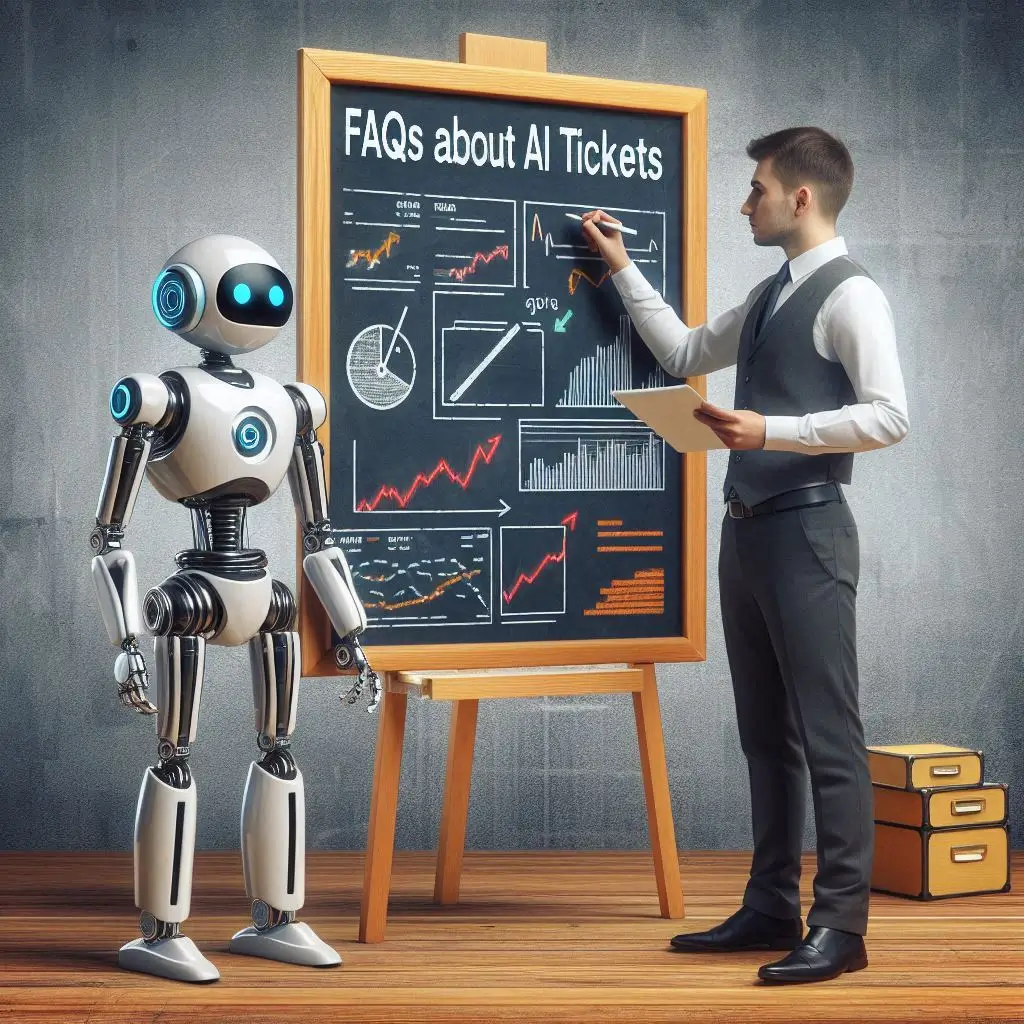Ever felt stuck in a customer support loop, repeating the same information over again? Or maybe you run a business and worry about long wait times or missed inquiries on your support line.
Well, fret no more!
Artificial Intelligence (AI) is making waves in customer service, and AI ticketing systems are revolutionizing how we handle support requests.
This guide will be your one-stop shop for understanding AI tickets. We’ll explore what they are, how they work, the benefits they offer, and how you can leverage them to transform your customer support experience.
So, get ready to learn more about AI ticketing!
Hey, wait! It’s a COMPLETE yet LONG guide — better use the Table of Contents to quickly jump to the section you are looking for!
Table of Contents
Your One-Stop Guide to Artificial Intelligence Tickets System (and How You Can Use It!)

What are AI Tickets?
Imagine a world where your customer support system can handle routine tasks automatically, answer basic questions in seconds, and even predict potential problems before they occur. That’s what AI ticketing systems are.
AI tickets are essentially traditional support tickets powered by artificial intelligence. These systems utilize machine learning algorithms to automate various aspects of the ticketing process. Here’s a breakdown of how they work.
How Do AI Tickets Work?
- It Starts With Ticket Submission: When a customer submits a support request through your website, email, or phone, the AI ticketing system kicks in. It analyzes the keywords and phrases used in the request to categorize it automatically. This could be a question about billing, a request for a feature update, or a bug report.
- Your Support Request is Routed via Smart Routing: Once categorized, the AI ticket system routes the request to the most appropriate support agent or department. This ensures that customers get connected with the right person who can best address their needs.
- You May Get Automated Responses for Everyday Queries: For simple inquiries, the AI ticket system can even generate automated responses. This might involve providing basic troubleshooting steps, directing customers to relevant knowledge base articles, or offering quick solutions to frequently asked questions.
- AI Tickets May Have Predictive Insights: AI ticketing systems don’t just react; they can also predict. By analyzing past ticket data, they can identify trends and patterns. This allows support teams to anticipate potential issues and proactively address them before they escalate into major problems.
- You Get to Enjoy 24/7 Support: One of the biggest advantages of AI ticketing systems is their ability to provide constant support. AI-powered chatbots can handle basic customer inquiries around the clock, even outside of business hours. This improves customer satisfaction by eliminating long wait times and offering immediate assistance.
How Are Artificial Intelligence Tickets Helping Businesses Now?
The traditional ticketing system, while functional, often struggles to keep up with the ever-growing demands of customer support. Here are some key pain points that AI ticketing systems effectively address.
- Speeds up Slow Resolution Times: Customers often get frustrated by long wait times and slow response rates to their support requests. AI tickets automate routine tasks and categorize requests, leading to faster resolution times.
- Caters to Agent Inefficiency: Support agents often spend a significant amount of time handling repetitive tasks. AI ticketing systems free up agents by automating these tasks, allowing them to focus on more complex issues and provide personalized support.
- Ensures 24/7 Support: Many businesses struggle to offer round-the-clock customer support due to resource constraints. AI ticketing systems bridge this gap by offering 24/7 availability through AI-powered chatbots.
- Reduces Missed Inquiries: Traditional systems might miss inquiries received outside of business hours or through multiple channels. AI ticketing systems consolidate inquiries from various channels and allow for immediate responses, even after hours.
- Makes Use of Data Analysis: Traditional systems often lack the ability to analyze past ticket data effectively. AI ticketing systems, on the other hand, can glean valuable insights from past interactions to improve future support strategies.
What are the Pros and Cons of AI Ticketing Systems?
AI ticketing systems offer a plethora of advantages for businesses and customers alike. However, like any technology, it’s important to consider both the pros and cons before integrating it into your system.
Pros of AI Tickets
- Improved Customer Satisfaction: Faster resolution times, 24/7 availability, and automated responses lead to a more positive customer experience.
- Increased Agent Efficiency: Automating repetitive tasks frees up agents to focus on complex issues and provide personalized support.
- Reduced Support Costs: Faster resolution times and proactive problem-solving lead to reduced support costs for businesses.
- Valuable Data Insights: AI ticket systems provide valuable data on customer inquiries and trends, leading to better support strategies.
- Improved Agent Training: AI can analyze past interactions and identify areas where agents need improvement, optimizing training programs.
Cons of AI Tickets
- Initial Investment Costs: Implementing an AI ticket system might require an initial investment. This can be a barrier for smaller businesses with limited resources.
- Limited Problem-Solving Capabilities: AI Tickets may struggle with complex issues requiring human judgment.
- Data Privacy Concerns: AI ticketing systems handle sensitive customer data. Security breaches or misuse of data can damage customer trust.
- Potential for Bias: Training data used for AI can introduce bias. Biased AI responses can lead to the biased treatment of customer groups.
- Lack of Human Touch: Overreliance on AI can create an impersonal customer experience. Customers may feel frustrated if they cannot connect with a human agent when needed.
How Your Business Can Make the Best Use of AI Tickets?
Now that you understand the core concepts of AI tickets, let’s explore how your business can leverage them to their full potential.
Here are some key strategies for maximizing the benefits of AI ticketing systems.
- Define Your Goals: Before implementing an AI ticketing system, clearly define your goals. Are you aiming to reduce wait times, improve agent efficiency, or gain deeper customer insights? Aligning your goals with the system’s capabilities will ensure a successful integration.
- Choose the Right System: There are various AI ticket systems available, each with its own strengths and weaknesses. Consider factors like scalability, customization options, and integrations with your existing CRM or support software.
- Train Your AI: The success of your AI ticketing system depends heavily on the quality of training data. Provide the system with accurate and relevant past tickets, knowledge base articles, and customer feedback to ensure it learns effectively.
- Maintain Human Oversight: While AI ticketing systems can automate many tasks, human intervention is still crucial. Ensure agents can monitor AI-generated responses, provide additional support when needed, and continuously refine the system’s training data.
- Gather Customer Feedback: Continuously assess customer satisfaction with your AI ticketing system. Encourage feedback through surveys or polls to identify areas for improvement and ensure the system is meeting customer needs.
- Focus on Personalization: While AI can handle routine tasks, don’t let it replace the human touch. Develop a strategy to integrate personalized interactions within the AI ticketing system. This could involve allowing agents to take over complex issues or offering escalation options for dissatisfied customers.
How to Integrate AI Tickets into Your Business: A Step-by-Step Guide
Here’s a step-by-step approach to integrating AI ticketing systems seamlessly into your business operations.
- Evaluate Your Needs: Analyze your current support processes and identify areas where automation can benefit your team and customers.
- Research and Select a System: Research various AI ticketing systems and choose the one that aligns best with your budget, needs, and existing technology stack.
- Prepare Your Data: Clean and organize your existing customer support data, including past tickets, knowledge base articles, and customer feedback.
- Integrate the System: Integrate the chosen AI ticketing system with your existing CRM, support software, and communication channels.
- Train Your Team: Provide comprehensive training to your customer support agents on using the new AI ticketing system and its functionalities.
- Monitor and Refine: Continuously monitor the performance of your AI ticketing system. Analyze customer feedback and agent performance, and adjust the system’s training data and settings based on your findings.
By following these steps, you can ensure a smooth and successful integration of AI ticketing systems into your business, leading to a more efficient and customer-centric support experience.
The Future of AI Tickets
AI ticketing systems are still evolving, but the future looks bright. Here are some exciting possibilities on the horizon.
- Advanced Chatbots: AI-powered chatbots will become more sophisticated, handling complex inquiries and even offering personalized product recommendations.
- Sentiment Analysis: AI will be able to analyze customer sentiment from ticket interactions, allowing businesses to identify and address customer dissatisfaction proactively.
- Omnichannel Support: AI ticketing systems will integrate seamlessly across all customer communication channels, providing a unified and consistent support experience.
- Predictive Maintenance: AI will leverage historical data to predict potential equipment failures or customer issues, allowing businesses to take preventative measures.
As AI technology continues to develop, AI ticketing systems will become even more integral to providing exceptional customer support. Businesses that embrace this technology will be well-positioned to improve efficiency, reduce costs, and delight their customers.
If this guide helped you, make sure to share Tech Trend Tomorrow with your friends and family!
10 Quick Helpful FAQs About AI Tickets

1. What are the different types of AI ticketing systems?
There are various types of AI ticketing systems available, each catering to specific needs. Some focus on automating routine tasks, while others prioritize self-service options or advanced chatbots.
2. Can AI tickets completely replace human agents?
AI tickets are excellent for automating tasks and handling basic inquiries. However, they cannot completely replace human agents. Human expertise is still crucial for complex issues, personalized support, and building positive customer relationships.
3. Is implementing an AI ticketing system complex?
This depends on your chosen system and existing infrastructure. However, most systems offer user-friendly interfaces and provide implementation support.
4. How can I measure the success of my AI ticketing system?
Keep track of customer satisfaction scores, average resolution times, agent productivity, first contact resolution rate, and the number of escalated AI tickets
5. What are some security considerations when using AI ticketing systems?
Ensure your system has robust security features like data encryption and access controls. Additionally, clearly define data privacy policies and how customer information is used within the system.
6. How can I ensure my AI ticketing system doesn’t become biased?
Make your training data diverse and representative of your customer base to minimize bias in the AI’s responses. Regularly review the system’s performance and adjust the training data as needed.
7. What are the ethical considerations of using AI ticketing systems?
Transparency is crucial when using AI ticketing systems. Customers should be aware that they are interacting with an AI and have the option to speak with a human agent if needed.
8. Can AI ticketing systems be used in all industries?
AI Tickets can be used for customer service and IT support for healthcare and education.
9. How much do AI ticketing systems cost?
The cost of AI ticketing systems can vary depending on the features offered, scalability, and the size of your business. Many vendors offer tiered pricing plans to suit different budgets.
10. What are some of the leading AI ticketing system providers?
Some popular options include Zendesk Sunshine, Freshdesk AI, Salesforce Einstein AI, and Microsoft Dynamics 365 Customer Service.

